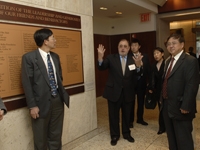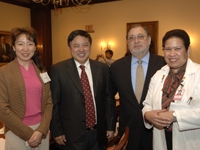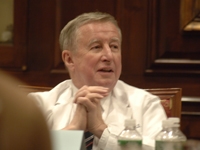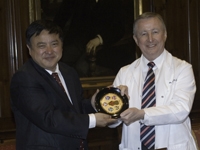
Steven Rosalie, associate provost for international initiatives and executive vice dean, leads the medical educators from Peking University through a tour of Weill Cornell Medical College.
Economic competition with China has occupied newspaper headlines in recent months, but during a recent visit to the Medical College by a delegation of 11 Chinese medical educators from Peking University, the focus was on exchanging the ideas and educational values that make both institutions leaders in their respective countries.
"It's a privilege to have our Chinese colleagues as guests and to have the opportunity to get together and share our thoughts and ideas about education," said Steven Rosalie, executive vice dean and associate provost for international initiatives. "Hopefully, this will be the start of an ongoing dialogue between faculty at the two institutions that will continue as we both evolve."
The visit was arranged to provide the delegation with an in-depth look at Weill Cornell's curriculum, in particular the College's use of problem-based learning (PBL). The three-day visit included a tour of the Medical College's education center and research facilities, an overview of the curriculum by Associate Dean for Curricular Affairs Dr. Peter Marzuk, a presentation and standardized patient demonstration presented by Dr. Yoon Kang, director of the Clinical Skill Training Program, and sitting in on student lectures and PBL sessions.
"We have noticed that our students need more creative thinking and we believe that has to be trained in small groups," said Dr. Zhe Dong, director for international programs at the Peking University Health Science Center.

Steven Rosalie and Dr. Carol Storey-Johnson, senior associate dean of education, with members of the visiting delegation.
Although Dr. Dong hopes to transform Peking University's curriculum based on Weill Cornell's model, it became clear that the schools already had a great deal in common, beginning with Weill Cornell's network of affiliations and partnerships that mirror the vast infrastructure of the state-run Chinese higher-education system.
"We have a lot in common: we are both metropolitan universities with a wide variety of cases and are leading research institutions," said Dr. Dong. Similarly, both countries face enormous health-care costs and aging populations with chronic conditions.
One connection was less clear. When the delegation arrived, they were given publications in the Medical College's trademark "Cornellian red" folders, causing Dr. Dong to joke, "What is the college's communist connection?"

Dean Gotto, who visited China in 1979, remarks upon witnessing a unique open-heart surgery that included acupuncture techniques.

Dr. Zhe Dong (left), director for international programs at the Peking University Health Science Center, emphasized that as leading nations, the Chinese and American medical communities must share both academically and culturally.

Dr. Dong presents Dean Gotto with a plate featuring a variety of traditional Chinese masks.

Dr. Oliver Fein, associate dean of affiliations, speaks with the group's translator, Yu-Ling Qiao, during the opening session of the visit on May 1.

